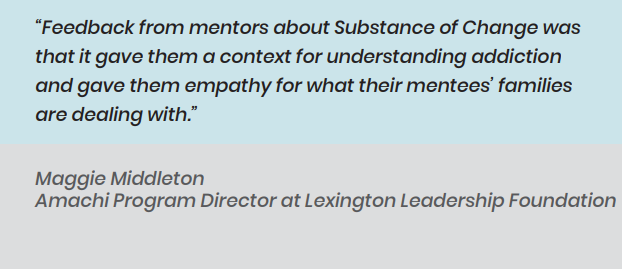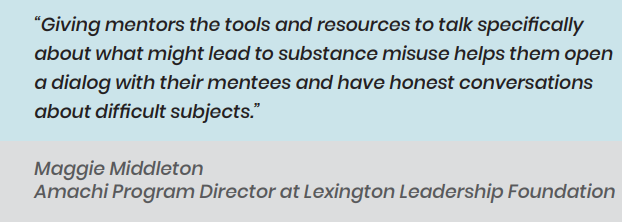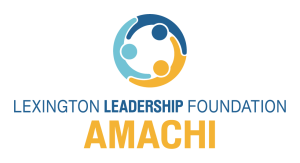Posted by jmeyer on March 21, 2022

Many of the children who participate in Lexington Leadership Foundation’s (LLF) community-based mentoring program have experienced having an incarcerated caregiver as well as other adverse life experiences that may negatively impact their futures. Some children have had a parent, relative, or close family friend in prison, whereas others may live in a high-crime or high-incarceration neighborhood. In contrast, many of the mentors in the LLF program have not had the types of stressful life experiences as their mentees have had. For many LLF mentors, joining the mentoring program is the first time they’ve developed a close relationship with a child who has been exposed to high levels of familial or environmental stressors. The LLF program seeks to help people from different worlds understand each other while providing support, resources, and compassion to young people.
LLF Program Director Maggie Middleton strives to provide relevant, useful, and empathic resources to matches in the Amachi Central Kentucky Mentoring Program. New mentors receive core, pre-match mentor training through Mentoring Central’s in-person course, Building Your Mentoring Skills, as part of their new match training. Middleton also encourages mentors to complete the asynchronous, on-demand, multimedia, interactive, web-based courses, Ethics & Safety for Community-Based Mentors and Building & Maintaining the Relationship, offered by Mentoring Central.
When presented with the opportunity to help shape advanced online training for mentors and to enroll experienced mentors in this supplemental training course to help them develop practical skills and strategies for supporting their mentees, Middleton immediately saw the value in offering additional training to LLF mentors.
The Amachi Central Kentucky initiative has been part of the Lexington LF since 2004. The national Amachi mentoring program was created in 2000 to serve children of incarcerated parents. This program operates under the premise that all children are filled with untapped potential and that a successful mentoring program can give at-risk youth the support they need to realize their potential as adults. The legal reasons for incarceration will vary, but for many families in the LLF program, issues related to drug and alcohol misuse have historically played a role in why a child’s loved one has gone to prison.
Central Kentucky is a college town, with the University of Kentucky nearby, and many of the LFF’s mentors are young and enthusiastic college students. The mentoring program currently has 140 children enrolled, ranging in age from 6 to 16 years old. As with most mentoring programs, the need extends beyond the number of mentors, so roughly 60 to 70 children are on the waiting list for being matched with a mentor. 
LLF has strong relationships with local school districts and individual schools. The group works with schools, community mental health agencies, and families to recruit mentees into the program. When social workers, teachers, and other professional family resources become aware of a child impacted by the incarceration of a loved one and who may benefit from LLF’s mentoring program, the caregiver is provided with information about the program and encouraged to complete an application for the child to join the program.
LLF uses a one-on-one friendship mentoring model and encourages matches to spend about an hour a week together. The organization owns and operates a community center where matches can meet after school and on weekends, and can use the kitchen, do homework, play games, do art projects, and use the gym. Mentors are encouraged to pursue active service projects in the community with their mentees. LFF also plans quarterly and monthly events and service projects for matches to do together.
Middleton and her team met one-on-one with caregivers and mentees to get a good sense of the strengths and assets of mentees. Caregivers were asked how incarceration has impacted the child’s life to get a sense of what resources were needed to support the child and the match. Based on this knowledge, Middleton provided input to the course developers about the needs of mentees in her program.
LLF participated in the pilot program of Mentoring Central’s Substance of Change: Building Assets in Mentees Affected by Substance Misuse course as part of its membership in the Leadership Foundations national network.  The course was developed with a particular focus on educating mentors about opioids, pathways to misuse of addictive substances, and the fact that addiction is an illness. The course gives mentors guidance, strategies, and reflective opportunities to enhance their skills and, in turn, support their mentees, who may be affected in some way by substance misuse — either due to risk exposure, their own misuse, or misuse within their family.
The course was developed with a particular focus on educating mentors about opioids, pathways to misuse of addictive substances, and the fact that addiction is an illness. The course gives mentors guidance, strategies, and reflective opportunities to enhance their skills and, in turn, support their mentees, who may be affected in some way by substance misuse — either due to risk exposure, their own misuse, or misuse within their family.
Mentors who took the Substance of Change course said it gave them a context for understanding addiction and greater empathy for what their mentees and their families are dealing with. The course directly addressed specific topics related to effective strategies for preventing underage use of alcohol, tobacco, or other drugs, as well as substance misuse; and helped mentors develop the tools needed to open the conversation with their mentees about these issues.
LLF mentors who took the Substance of Change course said it was well-organized, interactive, and easy to follow, and encouraged mentors to think about difficult issues in a new and productive way. Mentors and staff appreciated that the course provided opportunities to reflect and consider how to use new information as compared to trainings where they just receive information about substance misuse without knowing how to use this information to support their mentee. Middleton also found it helpful that the training was divided into smaller sections and that it didn’t have to be completed all in one sitting.

LLF is currently working on a plan to incorporate the course into the standard mentor training options offered by the organization. Middleton plans to offer the course to any mentor matched with a child impacted by substance misuse.
Notably, mentors liked the course so much that they asked Middleton if they could have a similar course with age-appropriate content that they could do together with their mentees. They thought that this type of resource could be beneficial for opening up intentional conversations that would be supportive of mentees.

For more information about Lexington Leadership Foundation:
422 Codell Drive
Lexington, KY 40509